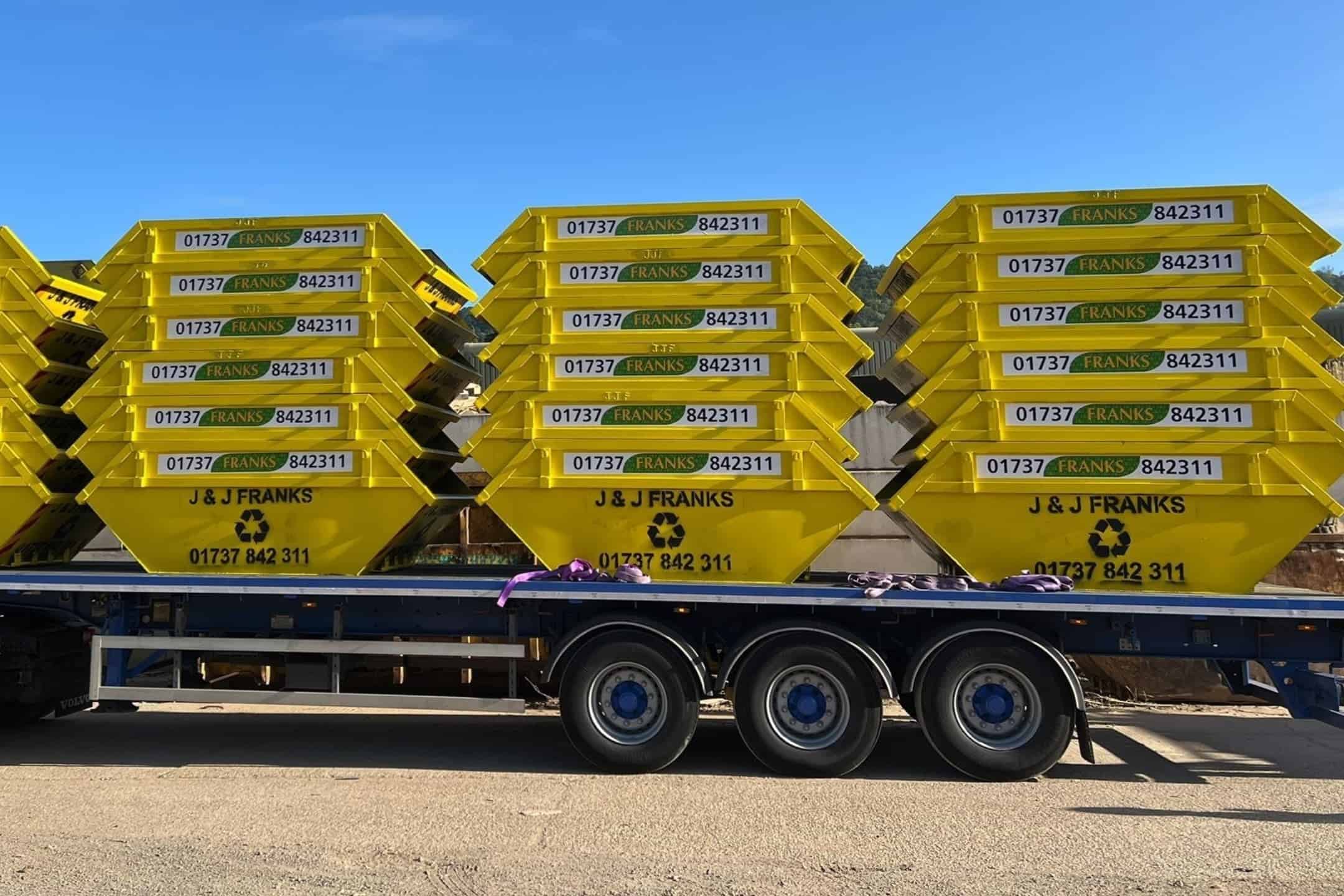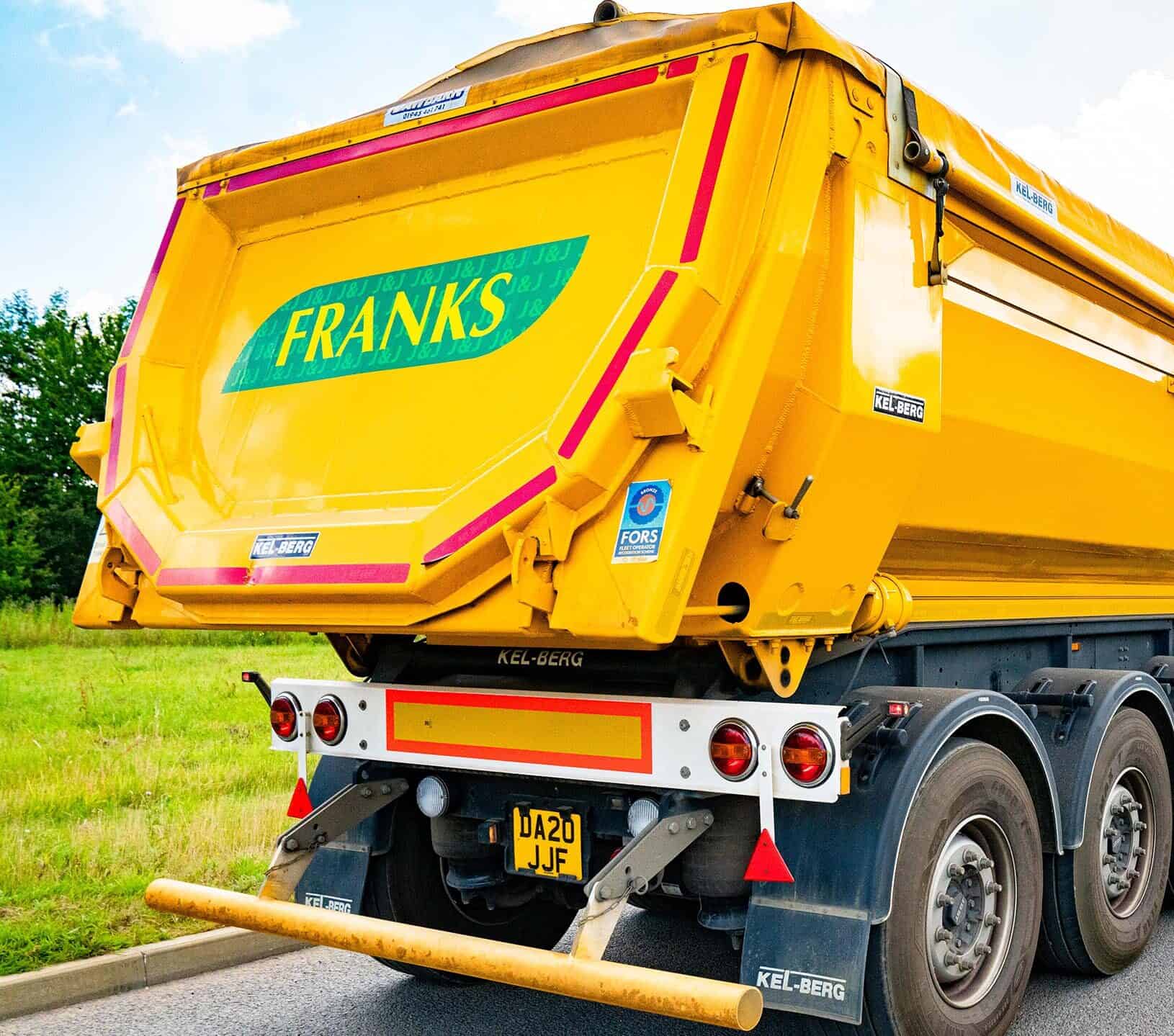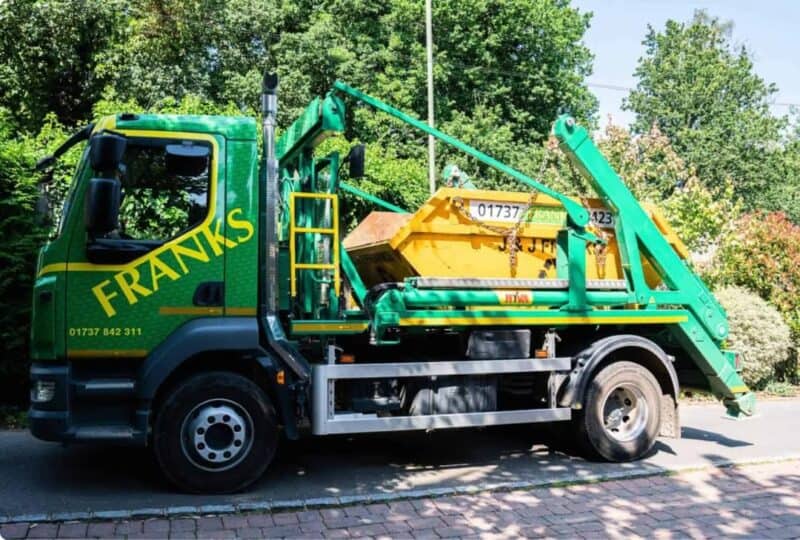As of January 2024, fees for disposing of small-scale DIY waste at council recycling centres have been abolished to reduce fly-tipping. However, restrictions may still apply, so checking with local facilities is recommended.
Understanding what materials can and cannot be placed in a skip is crucial for effective waste management. Proper disposal not only ensures compliance with environmental regulations but also reinforces safety and sustainability. Being well-informed helps both Redhill residents and businesses avoid potential fines and logistical issues associated with improper waste disposal.
Skip Hire in Redhill: Local Regulations
Hiring a skip in Redhill requires compliance with local council regulations, particularly if the skip is placed on public land such as a road or pavement. If placed on public land, a permit must be obtained from the local council to ensure the placement does not obstruct traffic or pose any safety risks. J&J Franks can assist you in securing the necessary permits, making the process straightforward for customers. It is always advisable to check specific requirements in Redhill before arranging a skip hire service.
Weight limits are an important consideration to make when hiring a skip. Overloading a skip beyond its designated capacity can make transportation unsafe and may result in penalties or even refusal of collection. Waste must be kept within the fill line to ensure it is removed safely and legally. If a project generates a high volume of heavy materials such as bricks or soil, selecting the appropriate skip size helps avoid exceeding weight restrictions.
Responsible waste disposal and recycling are also key elements of skip hire regulations. Redhill follows strict guidelines to reduce landfill use and encourage recycling wherever possible. As mentioned earlier, items such as hazardous waste, electrical goods and other specific materials must be disposed of separately through designated facilities.
Access Requirements in Redhill:
- Vehicles: The centre is accessible by car. Visitors using vans, pickups, or trailers may require a permit. It’s advisable to contact the centre in advance to confirm any specific requirements.
- Pedestrians: Pedestrian access is not permitted; entry is restricted to vehicles only.
What Can Go in a Skip ?
General Waste
Household waste such as furniture, paper and cardboard can be placed in a skip, making it a convenient solution for home clear-outs and renovation projects. General waste materials are non-hazardous and can often be sorted for recycling, reducing landfill waste.

Garden Waste
Organic waste, including soil, leaves, branches, grass cuttings is suitable for disposal in a skip. Garden waste is biodegradable and can often be repurposed for composting or recycled into landscaping materials.

Construction Waste
Building materials such as bricks, tiles, concrete and rubble are accepted in skips, making them ideal for construction and demolition projects. Although these materials are heavy, they can often be crushed and reused in new developments, reducing the need for virgin resources.

Wood & Metal
Wooden planks, doors, scrap metal can all be disposed of in a skip, providing a straightforward way to clear materials from construction sites and refurbishments. Many wood and metal items are recyclable, helping to minimise waste and support sustainable waste practices.

Plastics & Packaging
Non-hazardous plastic materials and packaging waste can be placed in a skip, helping businesses and households efficiently manage any excess plastic waste. These materials are often recyclable, ensuring they can be processed and reused rather than ending up in landfill.

What Can’t Go in a Skip?
Hazardous Waste
Materials such as asbestos, chemicals and solvents are classified as hazardous waste and cannot be placed in a skip. These materials present significant health and environmental risks, requiring specialist disposal to ensure safe handling while meeting regulatory compliance.

Hazardous Chemicals & Solvents You Cannot Recycle Normally:
- Paints & Varnishes – Oil-based paints, varnishes, and thinners.
- Pesticides & Herbicides – Weed killers, insecticides, and fungicides.
- Solvents & Thinners – Acetone, turpentine, white spirit, and methanol.
- Batteries – Lead-acid car batteries, lithium batteries.
- Oils – Engine oil, transmission fluid, and brake fluid.
- Cleaning Chemicals – Bleach, ammonia, drain cleaners.
- Fuel & Petroleum Products – Petrol, diesel, kerosene.
- Asbestos – Highly toxic and requires specialist disposal.
- Fluorescent Tubes & Bulbs – Contain mercury, which is hazardous.
- Laboratory & Industrial Chemicals – Strong acids, alkalis, and reagents.
How to Dispose of These Chemicals Properly:
- Household Waste Recycling Centres (HWRCs): Some accept certain hazardous waste like paint and batteries.
- Local Council Services: Many councils have hazardous waste collection schemes.
- Specialist Disposal Companies: For industrial and commercial chemicals.
- Pharmacies: Accept expired or unwanted medicines.
Electrical Items (WEEE Waste)
Electrical appliances, including TVs, fridges and washing machines, are prohibited from skips due to the specific recycling and disposal processes they require. These items contain components that can be harmful if not disposed of correctly, making it essential to take them to a designated WEEE recycling facility.
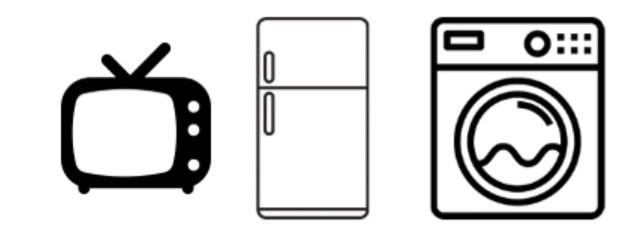
Batteries & Tyres
Batteries and tyres are not permitted for skip disposal due to strict environmental regulations. Batteries contain toxic chemicals that can leak into the environment, while tyres are difficult to process through standard waste streams and must be handled by specialist recycling centres.
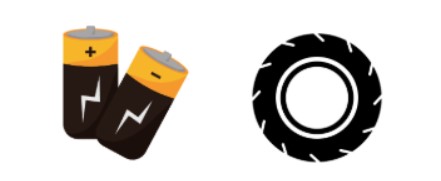
Gas Cylinders & Explosives
Gas cylinders and explosive materials, including pressurised containers, cannot be placed in skips as they pose serious safety risks. Even empty cylinders can retain residual gas, creating a fire hazard, so they must be returned to suppliers or disposed of through authorised facilities.
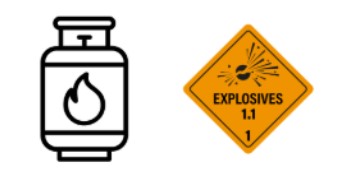
Medical & Biological Waste
Items such as sharps, medical equipment and contaminated waste are strictly prohibited from skips. These materials pose significant health risks and must be disposed of through specialist waste management services that follow strict guidelines for handling biological waste.

Types of Biological Waste:
- Human & Animal Waste: Blood, tissues, bodily fluids, excreta.
- Medical & Laboratory Waste: Contaminated dressings, used needles (sharps), microbiological cultures.
- Agricultural Waste: Animal carcasses, manure, plant matter from farming.
- Food Waste: Expired or contaminated food, organic kitchen waste.
- Biodegradable Waste: Leaves, grass, wood, compostable materials.
Nevertheless, Redhill accepts a wide range of materials
| Batteries (household and car) | Food and drink cans | Mixed glass bottles and jars | Printer cartridges |
| Books | Fridges and freezers | Metal | Spectacles |
| Cardboard | Furniture | Mixed paper | Tapes and disks |
| Carpet | Garden waste | Mobile phones | Textiles |
| Cartons | Gas bottles | Non-recyclable waste | TVs and monitors |
| Cooking oil | Hard plastic | Paint | Tyres |
| Electrical appliances | Household and garden chemicals | Plasterboard | Used engine oil |
| Fluorescent tubes | Mattresses | Plastic | Wood and timber |
| Foil |
Tips for Efficient Skip Hire
Choosing the right skip size is essential for efficient waste disposal and cost-effectiveness. Hiring a skip that is too small can lead to the inconvenience of needing additional collections, while an oversized skip may result in unnecessary costs.
For smaller home projects such as garden clearances or minor renovations, mini or midi skips often provide plenty of the space required. Larger projects, including full property renovations or construction work, require builder’s skips or even Roll-on Roll-off (RORO) containers.
Maximising the space within a skip allows for more efficient use of its capacity and reduces the likelihood of overfilling. Heavier materials such as bricks and concrete should be placed at the bottom to create a stable base, with lighter waste layered on top. Breaking down large items, such as furniture or wood planks, ensures they take up less space, allowing for more waste to be loaded into the skip. Careful organisation prevents the need for an additional skip and ensures compliance with weight limits and collection requirements.
Eco-friendly disposal and recycling practices are key to responsible waste management. Many materials placed in a skip can be recycled, reducing landfill waste and supporting sustainability efforts. Items such as metal, wood and certain plastics should be sorted whenever possible to improve recycling rates. Choosing J&J Franks for your skip hire in Redhill guarantees that all waste collected is handled responsibly, with a strong commitment to recycling wherever possible. Our expert waste management processes ensure that materials are sorted eco-consciously, diverting recyclable items from landfill and adhering to Surrey’s environmental standards.
Making the Right Choice for Waste Disposal in Redhill
Understanding what can and cannot be placed in a skip is essential for compliant and responsible waste disposal. General household waste, garden debris, construction materials and certain plastics can be disposed of safely in a skip, while hazardous items such as asbestos, electrical appliances and gas cylinders cannot be placed in a skip and must be handled through specialist services. Following these guidelines ensures compliance with local regulations and prevents unnecessary fines or collection issues.
Adopting environmentally-conscious disposal practices, such as recycling whenever possible and avoiding overfilled skips, helps reduce landfill waste and supports sustainability efforts in Redhill.
At J&J Franks, we offer reliable and responsible skip hire in Redhill. Whether for home renovations, garden clearances or large-scale projects, our team provides expert guidance and efficient waste disposal services. Get in touch today to arrange your skip hire service or to find out more.
